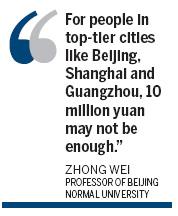
A statement by a top financial professor that people in big cities like Beijing may need at least 10 million yuan in savings for retirement has triggered hot debate.
Zhong Wei, professor of Beijing Normal University and a leading economist, said in an article in a business magazine that men usually survive for 17 years after retirement, while it is 24 years for women.
According to his hypothesis, a person can live up to 25 years after retirement due to longer life expectancy, so they need to save money equivalent to 20 years of their salary.
If a person retired in 2007, based on the average annual income for urban residents, they would need 275,000 to 500,000 yuan after retirement.
Considering the economic growth, income increases and inflation, he estimated urban people may need 3 to 5 million yuan of savings if they retire in 2027.
"Unfortunately, that was just the urban average in China. For people in top-tier cities like Beijing, Shanghai and Guangzhou, 10 million yuan may not be enough," he said in the March issue of Talents Magazine.
Tuo Guozhu, a professor at the Capital University of Economics and Business, said China has already entered into an aged society, with a quarter of its population over 60-years-old. But current policies would only cover a small proportion of the expenses for the grey legion to come. Most importantly, any change to the social insurance system, however slight, may lead to serious social disturbances.
Zhong's calculations have aroused a lot of different opinions.
Yang Lixiong, vice-director of China's Social Security Research Center at Renmin University, said Zhong's opinion seems exaggerated.
"Many factors have to be considered before we jump to the conclusion that 10 million yuan is not enough," he told METRO.
He said these factors include the actual inflation rate and the appreciation of the yuan, but, "without specific statistics, 10 million yuan is only a hypothesis".
But Yang also admitted that there are problems in the current policy of social insurance, and that Zhong's hypothesis was significant in a social sense, in that it highlights people's lack of security for the future.
In the wake of the international financial crisis, the problem of pensions has been placed firmly back on the table. A survey conducted by an insurance company shows that 93 percent of white-collar workers have thought about their life after retirement, but only 13 percent admitted that they had considered it "very seriously".
A senior logistics manager in a Fortune 500 company told METRO on the condition of anonymity that he is in full agreement with Zhong's opinion.
Accordingly, his plan is to retire at the age of 40, and go to a second-tier city.
Besides cutting the daily expenditure, he emphasized that expensive medical care is also a big problem for retirees.
"Go back to a small town, or move to a beautiful country; I shall by no means stay in a bustling metropolis in my autumn years," he said.
Another white-collar manager at an Australian mining company believed Zhong is simply being sensationalist.
When asked about his later life, he told METRO half-jokingly, "I'm not worried about myself, I am rich. I was born into a rich family."
METRO





